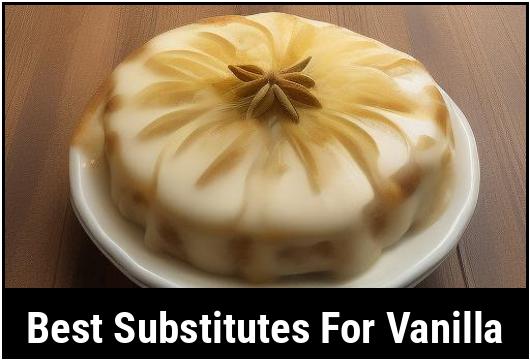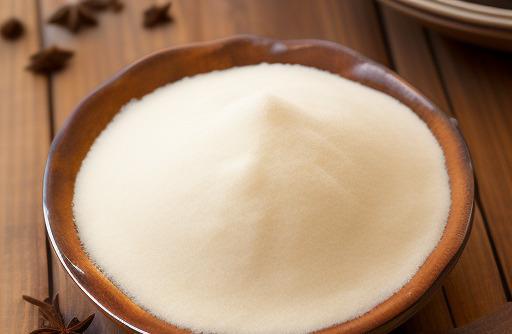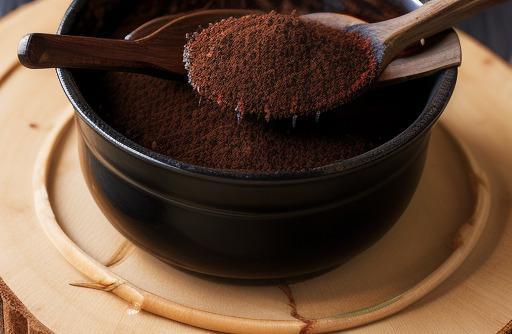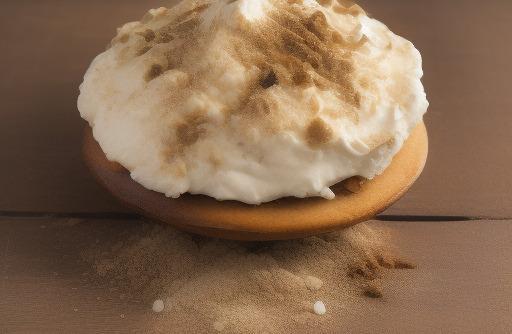- You are here:
- Home »
- Food Substitutes
- » Best Substitutes For Vanilla
Best Substitutes For Vanilla

Vanilla is a popular flavoring agent known for its sweet and aromatic taste. It is commonly used in various desserts, beverages, and baked goods to enhance their flavor profile. However, there are times when you may find yourself running out of vanilla extract or simply looking for alternatives to experiment with different flavors. In this article, we will explore the best substitutes for vanilla and how to use them effectively in your cooking and baking.
Key Takeaways
- Vanilla is a widely used flavoring agent known for its sweet and aromatic taste.
- There are various substitutes for vanilla extract available in the market.
- Substitutes for vanilla can be used in both sweet and savory dishes.
- Each substitute has its unique flavor profile and intensity, so it’s important to choose the right one for your recipe.
- Some popular substitutes for vanilla include almond extract, maple syrup, and cardamom.
Why You Need A Substitute For Vanilla
There are a few scenarios where you might need a substitute for vanilla extract:
- Running out of vanilla extract: It can be frustrating to realize that you’re out of vanilla extract in the middle of a recipe. Having a substitute on hand can save the day.
- Allergies or dietary restrictions: Vanilla extract is derived from the vanilla bean, which can cause allergies or may not be suitable for certain dietary preferences. In such cases, using a substitute can be a viable option.
- Experimenting with flavors: Sometimes, you may want to try a different flavor profile in your recipe. Using a substitute for vanilla extract allows you to explore new taste combinations.
Types Of Substitutes For Vanilla

When it comes to finding a substitute for vanilla extract, there are several options available. The choice of substitute depends on your personal preference and the specific flavor profile you wish to achieve in your dish. Here are a few common types of substitutes for vanilla:
- Other extracts: Almond extract, lemon extract, or coconut extract can add their unique flavors to your dish, making them a great substitute for vanilla. These extracts are strong, so use them in moderation to avoid overpowering the dish.
- Spices: Spices like cinnamon, nutmeg, and cardamom can provide depth and warmth to your recipe. They work well as a substitute for vanilla, especially in spice-based desserts or warm beverages.
- Sweeteners: Maple syrup, honey, or agave syrup can add a pleasant sweetness to your dish and serve as a substitute for vanilla extract. Be mindful of the increased moisture content and adjust other liquid ingredients accordingly when using sweeteners.
- Vanilla bean: If you don’t have vanilla extract but happen to have a vanilla bean, it can be a perfect substitute. Split the vanilla bean and scrape out the seeds to use in your recipe. Keep in mind that the flavor may not be as strong as using vanilla extract.
- Store-bought substitutes: There are also commercially available vanilla substitutes that mimic the flavor of vanilla extract. These products often contain a blend of different ingredients like extracts, artificial flavors, or natural enhancers.
Remember, the intensity and flavor profile of these substitutes may differ slightly from vanilla extract, so it’s essential to adjust the quantity accordingly and taste as you go.
Best Substitutes For Vanilla
- Almond Extract: Almond extract is a popular substitute for vanilla extract due to its sweet, nutty flavor. It complements both sweet and savory dishes and is commonly used in baking. When using almond extract as a substitute, make sure to use it sparingly, as it is much stronger than vanilla extract. Start with half the amount of almond extract compared to the vanilla extract called for in the recipe and adjust as needed. Note that the flavor of almond extract may not be suitable for all recipes, so be mindful of the overall taste profile.
- Maple Syrup: Maple syrup is not only a delicious topping for pancakes and waffles but also an excellent substitute for vanilla extract. It adds a subtle sweet and caramel-like taste to your dishes. Replace vanilla extract with an equal amount of maple syrup in your recipe. Keep in mind that maple syrup is liquid, so you may need to adjust the other liquid ingredients in your recipe accordingly.
- Cardamom: Cardamom is a highly aromatic spice that works well as a substitute for vanilla, particularly in warm desserts and beverages. It has a warm and slightly sweet flavor with hints of citrus and mint. Use ground cardamom and start with half the amount of vanilla extract recommended in the recipe. Adjust the quantity based on your taste preferences and the intensity of cardamom flavor desired.
- Lemon Extract: Lemon extract provides a bright citrus flavor and can be an excellent substitute for vanilla, especially in recipes like lemon-flavored cakes and cookies. Use lemon extract in equal amounts as you would use vanilla extract in your recipe. Be cautious not to overpower the dish with the strong citrus flavor, and adjust to your taste.
- Coconut Extract: Coconut extract is a popular substitute for vanilla extract in tropical desserts and beverages. It adds a delicate and slightly floral flavor to your dishes. Use coconut extract in equal amounts as you would use vanilla extract in your recipe. Be mindful of the specific recipe and flavor profile you are aiming for, as coconut extract may not be suitable for all dishes.
Remember, the best substitute for vanilla extract depends on the specific recipe and your personal taste preferences. Experiment with different substitutes to discover unique flavor combinations that work well in your favorite dishes.
Choosing The Right Substitute For Vanilla

Choosing the right substitute for vanilla depends on the flavor profile you want to achieve in your dish. Consider the following factors when selecting a substitute:
- Flavor compatibility: Different substitutes offer distinct flavors that may or may not complement your recipe. Consider the overall taste profile of your dish and choose a substitute that pairs well with the other ingredients.
- Intensity: Vanilla extract has a mild and sweet flavor. Some substitutes, like almond extract or spices, can be stronger and may dominate the dish if used in excess. Start with smaller quantities of the substitute and adjust as needed to avoid overpowering the other flavors.
- Personal preference: Some substitutes, such as coconut extract, may have more polarizing flavors that some people may not enjoy. Take into account your personal taste preferences and those of the individuals who will be consuming the dish.
- Recipe requirements: Some recipes may rely heavily on the flavor and aroma of vanilla extract. In such cases, it’s best to stick to the original recipe or find a close alternative that replicates the desired flavors.
It’s important to note that while substitutes can provide similar flavors to vanilla extract, they may not entirely replicate the taste and aroma of real vanilla. If possible, try to use vanilla extract in recipes where it plays a prominent role to enjoy the full vanilla experience.
Cooking With Substitutes For Vanilla
When cooking with substitutes for vanilla, it’s essential to make adjustments to the quantity and other ingredients to achieve the desired flavor. Here are a few tips to keep in mind:
- Start with less: Since substitutes like almond extract or spices tend to be stronger than vanilla extract, start with a smaller amount and gradually increase until you reach the desired flavor. Remember, you can always add more, but you can’t take it away once it’s added.
- Taste as you go: Throughout the cooking process, taste and adjust the flavors as needed. This will ensure that you maintain the balance in your dish and avoid overpowering other flavors.
- Adjust other liquids: Some substitutes like maple syrup or honey add moisture to your recipe. If using a liquid substitute, such as a sweetener, reduce the amount of other liquids in the recipe accordingly to maintain the desired consistency.
- Consider the cooking method: Certain substitutes may be more suitable for specific cooking methods. For example, spices like cardamom are excellent for baking and desserts, while extracts like almond or coconut work well in both sweet and savory dishes.
By being mindful of these considerations, you can effectively use substitutes for vanilla in your cooking and ensure that your dishes turn out flavorful and delicious.
Recipes Using Substitutes For Vanilla

Here are two recipes that showcase the use of substitutes for vanilla:
Almond Chocolate Chip Cookies:
Ingredients:
- 1 cup butter, softened
- 1 cup granulated sugar
- 1 cup brown sugar
- 2 large eggs
- 1 teaspoon almond extract
- 3 cups all-purpose flour
- 1 teaspoon baking soda
- 1/2 teaspoon salt
- 2 cups chocolate chips
Instructions:
- Preheat the oven to 350°F (175°C) and line a baking sheet with parchment paper.
- In a large mixing bowl, cream together the softened butter, granulated sugar, and brown sugar until light and fluffy.
- Beat in the eggs, one at a time, until well incorporated.
- Stir in the almond extract.
- In a separate bowl, whisk together the flour, baking soda, and salt.
- Gradually add the dry ingredients to the wet ingredients, mixing until just combined.
- Fold in the chocolate chips.
- Drop rounded tablespoonfuls of dough onto the prepared baking sheet, spacing them about 2 inches (5 cm) apart.
- Bake for 10-12 minutes or until lightly golden brown around the edges.
- Remove from the oven and let the cookies cool on the baking sheet for a few minutes before transferring them to a wire rack to cool completely.
Maple Cinnamon Granola:
Ingredients:
- 3 cups old-fashioned oats
- 1 cup chopped nuts (such as almonds or walnuts)
- 1 cup shredded coconut
- 1/2 cup pure maple syrup
- 1/4 cup melted coconut oil
- 1 teaspoon ground cinnamon
- 1/2 teaspoon salt
- 1/2 cup dried fruit (such as cranberries or raisins)
Instructions:
- Preheat the oven to 325°F (160°C) and line a baking sheet with parchment paper.
- In a large mixing bowl, combine the oats, chopped nuts, shredded coconut, ground cinnamon, and salt.
- In a separate bowl, whisk together the maple syrup and melted coconut oil.
- Pour the maple syrup mixture over the dry ingredients and mix until well coated.
- Spread the mixture evenly onto the prepared baking sheet.
- Bake for 20-25 minutes, stirring every 10 minutes, until the granola is golden brown and crisp.
- Remove from the oven and let cool completely.
- Once cooled, stir in the dried fruit.
- Store in an airtight container for up to two weeks.
Storage And Shelf Life Of Substitutes
The storage and shelf life of substitutes for vanilla may vary depending on the specific ingredient. Here are some general guidelines:
- Extracts: Store extracts like almond or lemon extract in a cool, dark place away from direct sunlight. They can typically last for several years if properly stored.
- Spices: Ground spices like cardamom or cinnamon should also be stored in a cool, dark place, but away from moisture. They can retain their flavor for up to one year.
- Natural sweeteners: Maple syrup or honey can be stored at room temperature in a sealed container. Maple syrup can last for about a year, while honey has a long shelf life and does not expire.
Always check the expiration date and follow the storage recommendations provided by the manufacturer for commercially available substitutes.
Conclusion
While vanilla extract is a staple in many kitchens, having a substitute for vanilla on hand can be useful when you want to try new flavors or run out of vanilla extract. By choosing the right substitute for your recipe and making proper adjustments, you can create delicious dishes with unique flavor profiles. Whether you opt for almond extract, maple syrup, or cardamom, exploring the wide range of substitutes for vanilla will undoubtedly expand your culinary creativity.
Pro Tip: When experimenting with substitutes for vanilla, start with a smaller amount and adjust gradually. You can always add more, but you can’t take it away once it’s added. Taste as you go to find the perfect balance of flavors.
FAQS
What Are The Best Substitutes For Vanilla?
Some of the best substitutes for vanilla include almond extract, maple syrup, honey, agave nectar, and molasses. These ingredients have similar flavor profiles to vanilla and can be used in a variety of recipes.
How Does Almond Extract Compare To Vanilla Extract In Baking?
Almond extract has a similar sweet and nutty flavor to vanilla extract, but it is much stronger. Therefore, it should be used in smaller quantities to avoid overpowering the recipe. Additionally, almond extract may not be suitable for those with nut allergies.
Can I Use Maple Syrup Instead Of Vanilla Extract?
Yes, maple syrup can be a good substitute for vanilla extract in many recipes. Its sweet and slightly smoky flavor profile can give a similar flavor profile to vanilla. However, since maple syrup is a liquid, you may need to adjust the recipe accordingly by reducing other liquids or increasing the dry ingredients.
How Does Honey Compare To Vanilla In Baking?
Honey has a distinct sweetness and floral flavor that can be used as a substitute for vanilla in some recipes. However, since honey has a strong taste, it may not be suitable for all baking recipes and may alter the overall flavor. Additionally, honey is a liquid, so adjustments to the recipe may need to be made.
Sources
About the Author Jenny
I'm Jenny, a housewife with an unwavering passion for food. My culinary journey began with my grandmother's kitchen, and it's now a full-fledged food blog. I've turned my love for cooking into a creative outlet, sharing recipes and stories with a global community of fellow food enthusiasts. It's proof that being a housewife can also mean pursuing your passions and savoring life's delectable moments.
